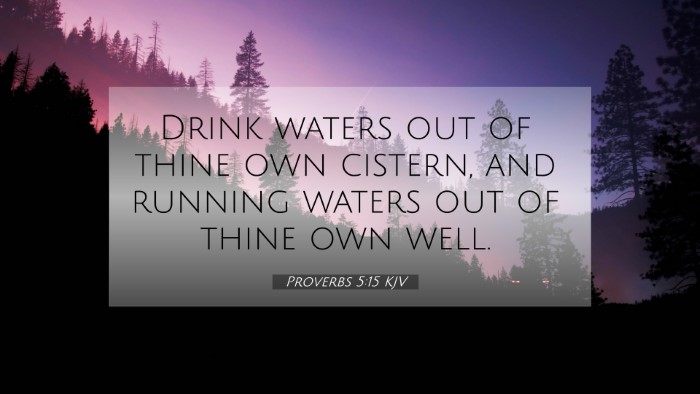Proverbs 5:15 - A Deep Dive into Biblical Interpretation
Understanding the Verse: Proverbs 5:15 states, "Drink waters out of thine own cistern, and running waters out of thine own well." This verse emphasizes the importance of faithfulness and the exclusive pursuit of one's own relationships, particularly in the context of marriage and moral conduct.
Meaning Explored Through Commentaries
Matthew Henry's Commentary Insights: Henry suggests that this verse metaphorically speaks to the significance of fidelity in marriage. He illustrates that just as one would draw water from their own well, one should maintain loyalty and devotion to their spouse. He warns against seeking fulfillment from external, illicit sources, as this leads to moral decay.
Albert Barnes' Analysis: Barnes elucidates that the "cistern" and "well" symbolize the blessings of a committed relationship. He links this idea to the concept of contentment—finding satisfaction in the companionship and love provided by one's partner. Barnes stresses that the pursuit of outside relationships leads to bitter consequences and chaos in one’s life.
Adam Clarke's Explanation: Clarke expands on the imagery, suggesting it denotes the purity and strength derived from a faithful union. He interprets the "waters" as the joys and pleasures that should be found within the bounds of marriage. Clarke underscores the biblical idea that true fulfillment comes from commitment rather than infidelity.
Cross-Referencing Related Bible Verses
This verse connects with several other Scriptures that speak to the themes of fidelity, satisfaction, and moral integrity:
- Genesis 2:24 - "Therefore shall a man leave his father and mother, and shall cleave unto his wife: and they shall be one flesh." This verse emphasizes the sanctity of marriage.
- Proverbs 6:30-31 - "Men do not despise a thief, if he steal to satisfy his soul when he is hungry; but if he be found, he shall restore sevenfold; he shall give all the substance of his house." This speaks to the shame of pursuing what does not belong to you.
- 1 Corinthians 7:2 - "Nevertheless, to avoid fornication, let every man have his own wife, and let every woman have her own husband." This reinforces the moral framework for relationships.
- Hebrews 13:4 - "Marriage is honorable in all, and the bed undefiled: but whoremongers and adulterers God will judge." This verse highlights the divine judgment against infidelity.
- James 1:14-15 - "But every man is tempted, when he is drawn away of his own lust, and enticed." This speaks to personal responsibility in moral decisions.
- Proverbs 4:23 - "Keep thy heart with all diligence; for out of it are the issues of life." This emphasizes guarding one's affections and desires.
- John 4:14 - "But whosoever drinketh of the water that I shall give him shall never thirst; but the water that I shall give him shall be in him a well of water springing up into everlasting life." This connects spiritual satisfaction with living waters.
Thematic Connections
Proverbs 5:15 and its commentaries highlight several recurring biblical themes:
- Fidelity in Relationships: Across the Bible, integrity within marriage is emphasized, promoting the idea that true joy and satisfaction can only be found within loyal partnerships.
- Consequences of Infidelity: Many scriptures warn about the dangers and repercussions of seeking love and fulfillment outside one's marriage vow.
- Satisfaction in God’s Provision: Just as one drinks from their own well, believers are encouraged to find their needs met in the relationships and resources God has ordained for them.
Tools for Further Study
For those interested in exploring cross-references in the Bible, consider the following resources:
- Bible Concordance: Useful for finding keywords and their occurrences throughout scriptures.
- Bible Cross-Reference Guide: A handy tool to trace themes and verses that relate to one another.
- Cross-Referencing Bible Study Methods: Approaches that enhance understanding by drawing parallels between texts.
- Bible Reference Resources: Comprehensive materials that assist in studying inter-Biblical dialogue.
Conclusion
The overall message encapsulated in Proverbs 5:15 reinforces the importance of loyalty, contentment, and the blessings found within committed relationships. By observing the wisdom imparted through this verse and related scriptures, believers are urged to cherish their bonds, resist temptations, and drink deeply from the well of their own marriages.





